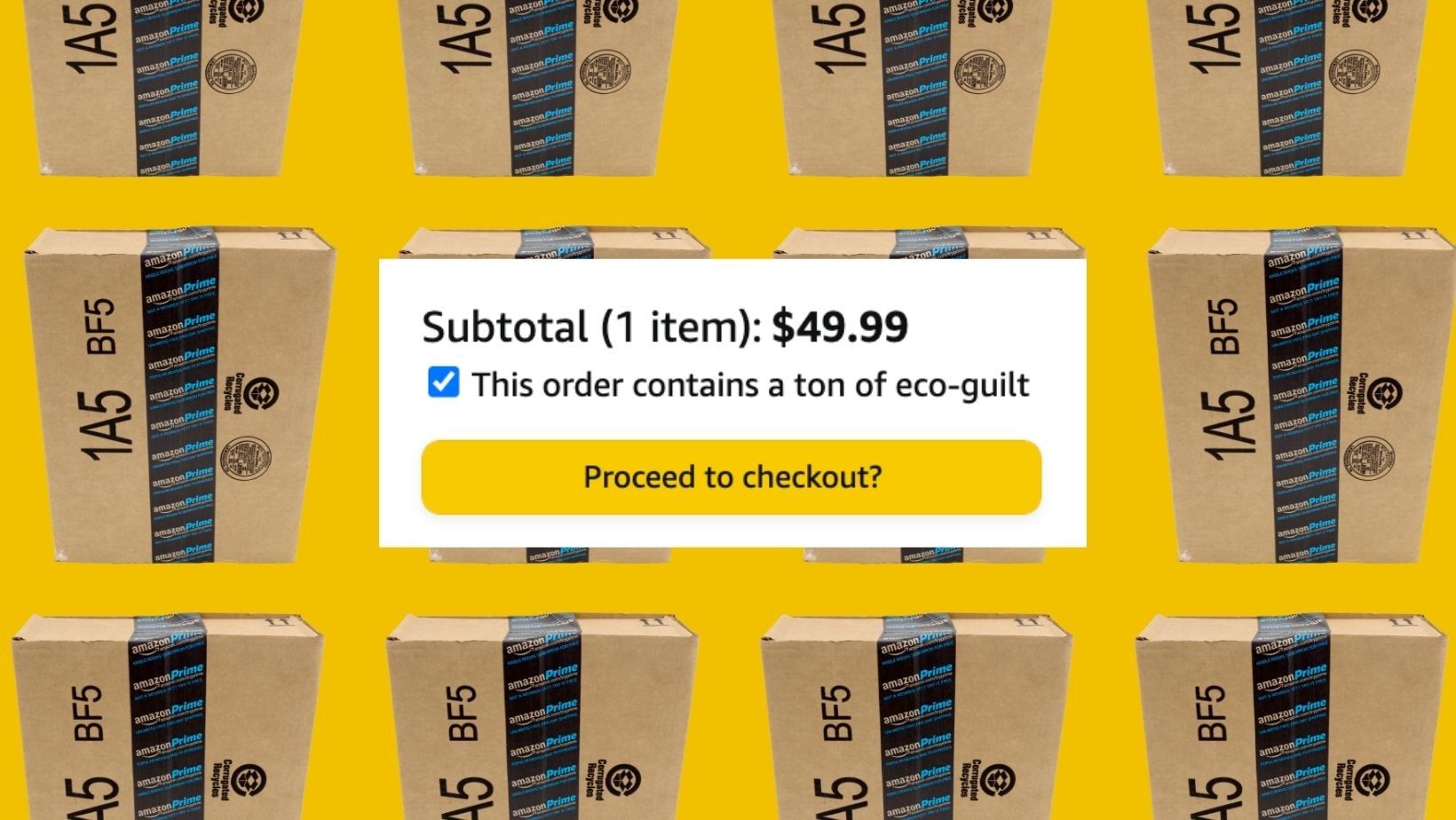
If you were to ask every American whether they shop on Amazon, how many do you think would say yes? 25%? 50%?
According to a 2017 study by CNBC, a whopping 65% of people search Amazon for products either ‘always' or ‘most of the time' and 76% of shoppers said they would do most of their holiday shopping on Amazon. This study was done almost four years ago, but the point still remains - many Americans can't help but love to shop on Amazon because it's insanely convenient and yet, Amazon is the company we love to hate.
The ability to get that last-minute travel-sized body wash or gift in 24 hours is nothing short of magical, but how can we minimize the eco-guilt we feel when it is flown to us overnight in a package four times its size, boxed by a person that might be working an overnight shift with minimal pay?
This story is not new, but it's not aging well. To anyone born before 1995 that remembers the true glory of the AOL dial-up sound, you may also remember You've Got Mail, in which the love story between Meg Ryan and Tom Hanks was entangled in the buy-out of our favorite neighborhood bookstore by the new behemoth in town, Fox & Sons.
We know that Fox & Sons is the fictional Barnes & Noble (sorry, Borders, you didn't make the cut), but who would have guessed in 1998 that we'd eventually feel sorry for these massive bookstores (and every other brick and mortar store) because of a man named Jeff Bezos. Today, avoiding Amazon for holiday shopping feels like Frodo parting with the ring...
...partially because we're addicted to convenience and partially because of some undeniable holiday procrastination.
Instead of telling people to avoid Amazon altogether, we've rounded up some secret (and not-so-secret) tips to help you hit that 'Add to Cart' button with a little less guilt this holiday season. In order to add some pizzazz to our list and encourage you to read on, we'll end with our #1 recommendation (which also has to do with a little bit of patience).
TIP: SEARCH FOR 'FRUSTRATION-FREE PACKAGING'
When you type this into the Amazon search bar, eligible products that are designed to ship without any extra packaging will show up. Similar to going plastic-free, when we limit the amount of unnecessary packaging that comes with the products, the less packaging goes to waste.
TIP: SHOP SECOND HAND ON AMAZON
You can buy used items on Amazon's website via Amazon Second Chance. Buying second hand supports circularity principles by keeping stuff at its highest value and best use for longer.
TIP: CHOOSE 'SOLD AND SHIPPED BY AMAZON'
Make sure whatever you're buying is actually being shipped from an Amazon distribution center and not from a third-party seller. This may seem counterintuitive since you might be thinking of the benefit of shopping from an independent retailer. From an environmental perspective, however, if you're choosing to dip your toe in the Amazon shopping game, you've got to dive in all the way to take advantage of their economies of scale.
TIP: SET UP AN AMAZON DAY
When you set up an Amazon Day, you are dedicating a single day of the week when all of your orders will be delivered. This is a slower delivery option and, similar to above, allows your delivery to support fuller trucks and greater efficiencies. To do this, simply type in 'Amazon Day' to the site's search bar.
TIP: CHOOSE NO-RUSH SHIPPING
This is the most impactful thing we can do when shopping on Amazon. I love the magic of Prime as much as the next person, but of all the impacts when shopping online, how those products reach us is our biggest impact as consumers. Unfortunately, this may mean you have to start the holiday shopping plan a bit earlier (or set the expectation with your loved ones that late presents are an even greater gift because they're also a gift to the planet...though I'm not sure my baby cousin will appreciate that, yet).
While it may come as a surprise, of ten types of shoppers, the online shopper is not normally the most impactful on the environment. The most problematic shopping habit is actually the 'impatient modern shopper' - or a person who shops both online and in-store, but ends up buying online. That's because they're releasing emissions to drive to and from the store, and then emitting even more by making a final purchase online, which drives up energy required for data storage and last-mile emissions.
According to the co-director of UC Davis' Sustainable Freight Research Center Miguel Jaller, 'E-commerce is not the evil, I don't think. The evil comes from the abuse of e-commerce, because it's so convenient that we're abusing the opportunity to have a really nice and eco-friendly option that consolidates in cargo.'
Jallerclaims that shopping exclusively online is about 87% more efficient than doing all of your shopping in-store, in terms of greenhouse gas emissions and vehicle miles traveled. The problem is when we add the prime or next-day shipping. Expedited shipping adds a logistical challenge because a company can't get the benefit of consolidation and is actually obliged to go multiple times, on multiple days, to the same location. In a Prime shipping world, delivery vehicles go from 80% full to just 10% or 20% in some scenarios.
SO, LET'S RECAP.
The good news is that we can continue to shop online when we need things and it's often better than doing so in-person if we're using a car. The bad news is that the way we're currently using online shopping platforms like Amazon is probably not optimized for an eco-guilt-free holiday season. That said, we'd love to challenge you to try to implement some of our tips and let us know how it's going!
Want to see science-backed sustainability ratings on all of your fav products on Amazon?
